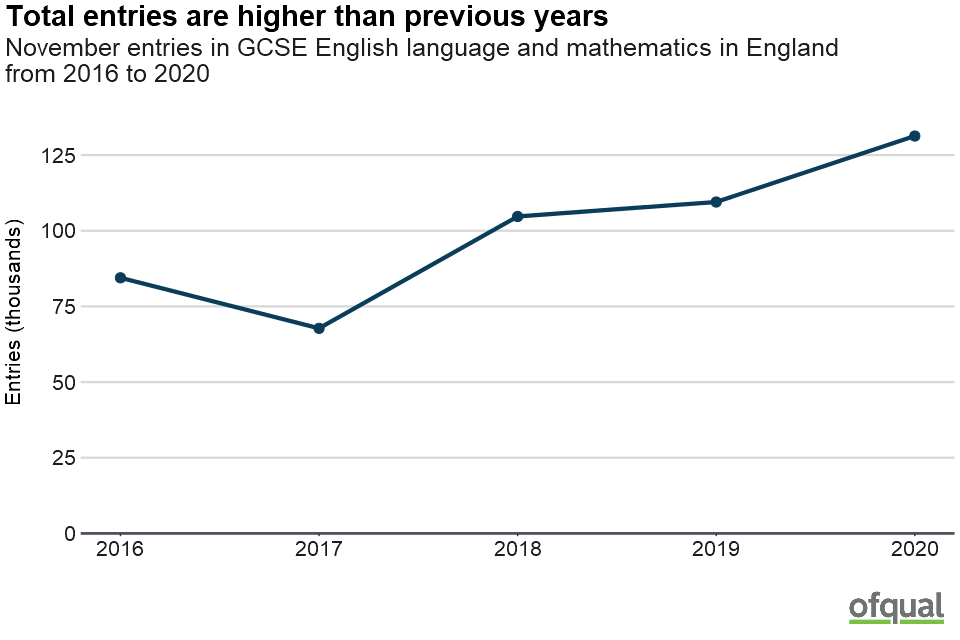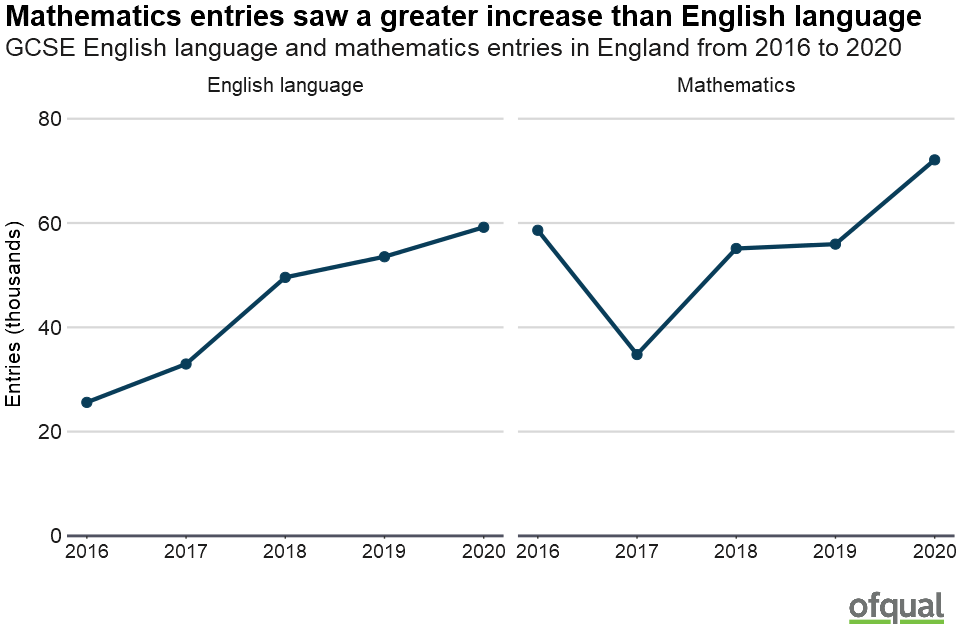Provisional November 2020 exam entries: GCSEs
Published 26 November 2020
Applies to England
This report presents provisional figures on the number of entries for GCSE English language and mathematics submitted by schools and colleges in England to exam boards by 28 October 2020 for exams being sat in November 2020. The November 2020 series is usually restricted to students who were aged at least 16 by the end of the preceding August. This year, younger students were also able to enter the November series in cases where they had entered for the summer 2020 series or when exam boards believed they had intended to. All the November 2020 entries reported in this release are for students sitting GCSE English language and/or GCSE mathematics. In 2020 all GCSE, AS and A level qualifications were made available for examination following the cancellation of the summer series and statistics relating to entry for other GCSEs and all subjects at AS and A level were published separately as their entry deadlines were earlier than those for GCSE English language and mathematics.
1. November entries over time
Overall, GCSE entries in English language and mathematics in November 2020 increased by 20%, from 109,495 in 2019 to 131,300.

A line chart showing the November entries in GCSE English language and mathematics in England from 2016 to 2020. Total entries are higher than previous years. Further details are listed under the heading "November entries over time".
| Year | Total entries | Percentage change compared to previous year |
|---|---|---|
| 2016 | 84,450 | n/a |
| 2017 | 67,755 | -20% |
| 2018 | 104,710 | 55% |
| 2019 | 109,495 | 5% |
| 2020 | 131,300 | 20% |
Variations in entries over recent years may reflect changes in re-sit requirements related to funding, the transition from legacy to reformed qualifications, and availability of assessments. In 2020, demand may have increased due to the cancellation of the summer exam series. In addition to students who would normally be entitled to take GCSEs in English language and maths in November, students, regardless of their age, who had entered for the summer exams or who the exam board believed had intended to enter for those exams were also able to enter the November 2020 series.
2. November GCSE entries by subject
There were 72,115 entries in GCSE mathematics in November 2020 compared to 55,955 entries in November 2019, an increase of 29% on the previous year after remaining relatively stable last year.
Entries in English language also saw an increase to 59,185, representing an 11% increase on 2019, continuing the trend seen during the previous 5 years.

A line chart showing the GCSE English language and mathematics entries in England from 2016 to 2020. Mathematics entries saw a greater increase than English language. Further details are listed under the heading "November GCSE entries by subject".
| Subject | Year | Total entries | Percentage change compared to previous year |
|---|---|---|---|
| English language | 2016 | 25,610 | n/a |
| English language | 2017 | 32,970 | 29% |
| English language | 2018 | 49,585 | 50% |
| English language | 2019 | 53,540 | 8% |
| English language | 2020 | 59,185 | 11% |
| Mathematics | 2016 | 58,615 | n/a |
| Mathematics | 2017 | 34,785 | -41% |
| Mathematics | 2018 | 55,125 | 58% |
| Mathematics | 2019 | 55,955 | 2% |
| Mathematics | 2020 | 72,115 | 29% |
3. GCSE mathematics by tier
GCSE mathematics is a tiered qualification with foundation and higher tiers. The tier of entry determines the possible range of grade outcomes. November entry for GCSE mathematics tiers followed a similar pattern to previous years with the majority (93%) of entries in 2020 being for the foundation tier.

A bar chart showing the tier of entry for mathematics in November series from 2017 to 2020. The majority of mathematics entries are for the foundation tier. Further details are listed under the heading "GCSE mathematics by tier".
| Year | Foundation tier entries | Higher tier entries | Percentage foundation tier |
|---|---|---|---|
| 2017 | 30,345 | 4,440 | 87% |
| 2018 | 51,440 | 3,685 | 93% |
| 2019 | 52,860 | 3,095 | 94% |
| 2020 | 66,935 | 5,180 | 93% |
These data suggest that the majority of entries have been made by candidates who are re-sitting the foundation tier so that they may continue studying and be funded post-16.
4. GCSE entries by year group
Overall, year 12 entries increased by 4% from 60,090 in 2019 to 62,565 in 2020.
The total year 13 entries increased by 37% from 49,400 in 2019 to 67,450 in 2020, making this older age group the largest group in contrast to recent years where year 12 students have been the largest group.

A line chart showing the November GCSE English language and mathematics entries in England by year group from 2016 to 2020. Increases are mainly due to entrants in year 13 & above. Further details are listed under the heading "GCSE entries by year group".
| Year | Year 11 & below | Year 12 | Year 13 & above | Total entries |
|---|---|---|---|---|
| 2016 | 1,365 | 43,850 | 39,235 | 84,450 |
| 2017 | 25 | 43,480 | 24,250 | 67,755 |
| 2018 | 50 | 57,650 | 47,010 | 104,710 |
| 2019 | 0\~ | 60,090 | 49,400 | 109,495 |
| 2020 | 1,285 | 62,565 | 67,450 | 131,300 |
Year 12 entries in English language decreased by 8% compared to 2019 but there was a large increase in entries from year 13 & above (30%).
Mathematics entries increased for year 12 candidates, but the biggest change was for year 13 & above where entries increased by 42% compared to 2019.
| Subject | Year group | 2019 | 2020 | Change in entries | Percentage change |
|---|---|---|---|---|---|
| English language | Year 12 | 30,420 | 28,125 | -2,295 | -8% |
| English language | Year 13 & above | 23,120 | 30,050 | 6,930 | 30% |
| Mathematics | Year 12 | 29,670 | 34,440 | 4,770 | 16% |
| Mathematics | Year 13 & above | 26,285 | 37,400 | 11,115 | 42% |
5. Background information
In this release, Ofqual presents data on the number of provisional entries for GCSEs in England received by exam boards for the November 2020 exam series. In England, GCSE English language and GCSE mathematics exams are routinely available in November. Since 2017, entry has been limited to students who were aged 16 or above on 31 August of the year of the November series. This year any students, including younger candidates, who were entered in the summer and wished to do so could sit these exams. The series was also open to students the exam boards believe had intended to enter but were unable to do so because they could not receive a centre assessment grade.
The figures for entries can change daily up to the day of the exams. We collect provisional data at the point when it is reasonably complete, although final entry numbers may be slightly different from these. The figures presented here are the provisional figures as submitted by schools and colleges to exam boards by 28 October 2020.
In this release, all figures are rounded to the nearest 5 to ensure confidentiality of data.
Further information on this release is available in the detailed background information and data tables accompanying this release.
6. User feedback
We welcome your feedback on our publications. Should you have any comments on this statistical release and how to improve it to meet your needs please contact us at data.analytics@ofqual.gov.uk.
Head of profession: Vikas Dhawan

